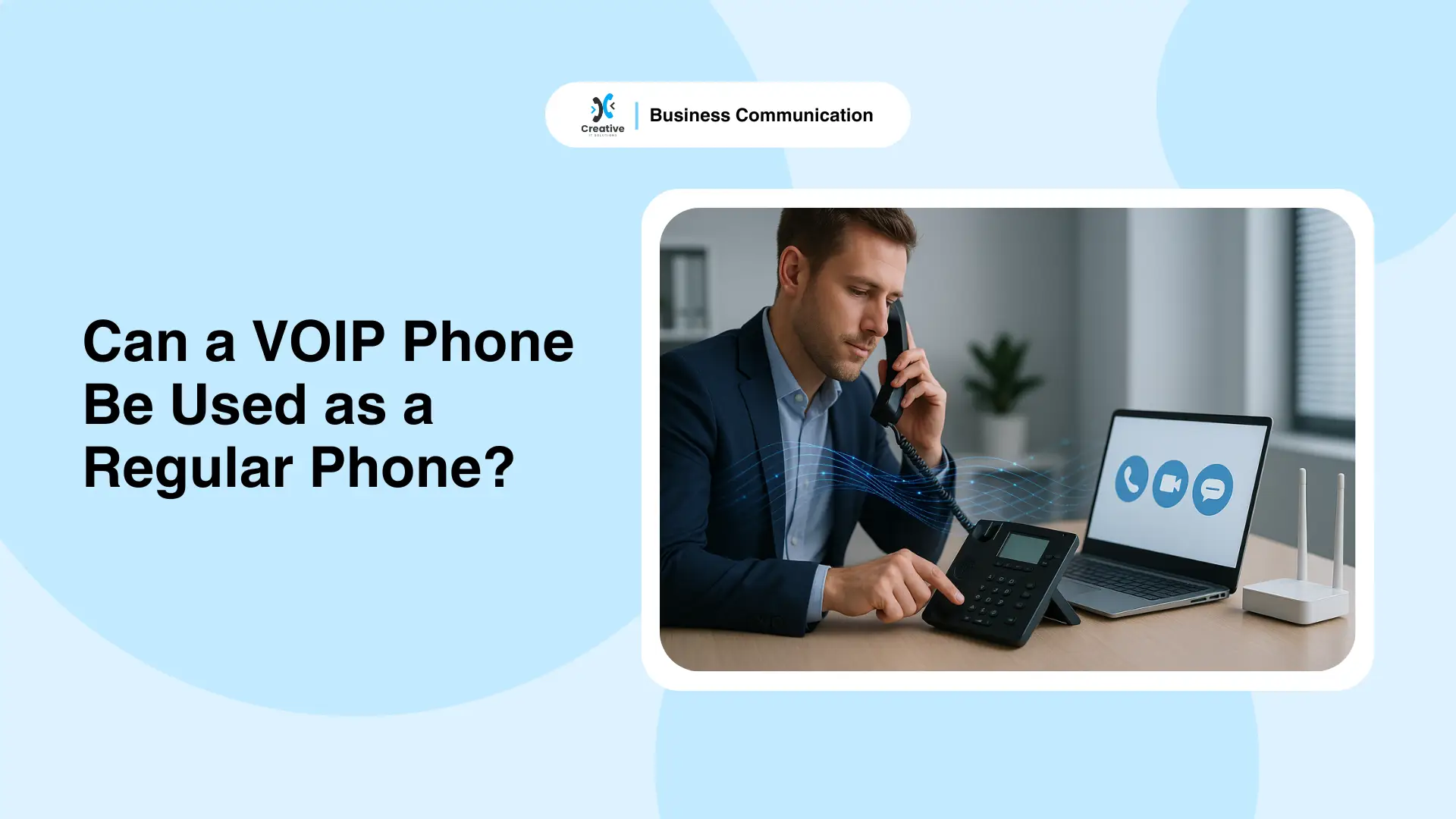Yes, a VOIP phone can be used as a regular phone – and in fact, it can do much more. The main difference is not how you use it, but how it connects. A traditional phone works through copper telephone lines, while a VOIP (Voice over Internet Protocol) phone uses your internet connection to make and receive calls.
That means instead of plugging your phone into a wall jack, you plug it into your router or connect it wirelessly over Wi-Fi. Once connected, your voice is converted into small digital data packets that travel across the internet and reach the receiver instantly – just like a normal phone call.
Modern VOIP communication systems look and feel the same as traditional phones, but they come with advanced features such as call forwarding, voicemail-to-email, video calling, and even CRM integration. You can use them on a desk phone, smartphone, laptop, or web app – all without needing separate telephone wiring.
So, if you’re wondering whether you can replace your regular phone with VOIP, the answer is yes. VOIP gives you all the convenience of traditional calling but adds flexibility, mobility, and significant cost savings. That’s why both households and businesses are now switching from analog lines to internet-powered communication.
Table of Content
ToggleHow Is VOIP Different from Regular Telephone Lines?
The main difference between VOIP and regular telephone lines lies in how they transmit your voice. Traditional phones send sound as electrical signals through copper wires owned by telecom companies. VOIP, on the other hand, converts your voice into digital data and sends it over the internet – the same way emails or video calls travel online.
Because VOIP uses an internet connection instead of a physical phone line, it removes the need for bulky hardware, wiring, and expensive maintenance. You don’t have to install new telephone lines every time you add an employee or a new branch – just connect your device to the network and start calling.
Regular telephone systems are limited by location. You can only use them where the wiring is available. But VOIP communication systems give you complete freedom – you can make or receive business calls from your laptop, smartphone, or even a tablet from anywhere in the world.
From a cost perspective, VOIP is far more efficient. Regular phone networks charge extra for long-distance or international calls, while VOIP routes all calls through the internet, keeping your communication costs predictable and low.
That’s why more businesses are replacing landlines with cloud-based VOIP communication systems – they’re faster, scalable, and better suited to the flexible way we work today.
Can You Use a Regular Phone for VOIP?
Yes, you can use a regular phone for VOIP – you just need the right adapter or compatible device. This is one of the reasons many businesses and households transition smoothly to VOIP without replacing all their hardware.
Traditional analog phones are designed to work with telephone lines, not the internet. However, with a simple device called an ATA (Analog Telephone Adapter), you can connect your existing landline handset to a VOIP network. The ATA plugs into your router or modem and converts the analog signal from your phone into digital data that can travel over the internet.
If you prefer a more direct solution, IP-enabled phones are also available. These phones look like regular desk phones but have built-in VOIP technology that connects directly to your Wi-Fi or Ethernet cable – no adapter needed.
The benefit of this setup is cost efficiency and convenience. You can reuse your old hardware, keep your familiar phone design, and still access all the modern VOIP features like call forwarding, voicemail-to-email, and high-quality audio.
This hybrid approach lets businesses modernize communication without major infrastructure changes – proving that a VOIP phone can be used just like a regular phone, but with smarter technology behind it.
Related Post: What Are the Advantages of Using VOIP Over Traditional Phone Systems?

Benefits of VOIP Phones as Regular Phones
The biggest advantage of VOIP technology is that it offers everything a traditional phone can – plus a lot more. Once connected, a VOIP phone can be used as a regular phone for daily calling, but with better features, lower costs, and total flexibility.
1. Cost Savings on Local and International Calls
With VOIP, your calls travel through the internet instead of a telephone network. This removes the high per-minute charges of traditional phone lines. Local calls become nearly free, and international calls are up to 70% cheaper. For growing businesses, this translates into major long-term savings.
2. Mobility and Remote Calling Flexibility
Unlike landlines, VOIP isn’t tied to a physical location. You can make or receive calls from your office, home, or even while traveling – using the same business number. This flexibility is one of the biggest benefits of VOIP phones, especially for remote teams and hybrid workplaces.
3. Integration with Mobile and Web Apps
Modern VOIP communication systems integrate easily with CRM, email, and collaboration tools. You can make calls directly from your browser or connect your VOIP line to business apps like Microsoft Teams or HubSpot. This integration streamlines workflow and boosts productivity.
4. Multi-Device Usage (Laptop, Tablet, or Softphone)
VOIP works across all devices. You can use your laptop, tablet, or even a softphone app on your mobile to handle business calls. This multi-device access means you’re never disconnected, no matter where you work from.
5. Cloud-Based Control and Scalability
Because VOIP runs on cloud servers, you can manage your entire system online – add users, monitor calls, and set up IVR menus with just a few clicks. This cloud-based structure also makes scaling effortless, whether you’re a 5-person team or a 500-person company.
VOIP vs Regular Phone – Key Differences
When you compare VOIP vs regular phones, the difference goes far beyond just the type of connection. Traditional phones depend on physical telephone lines, while VOIP uses the internet to transmit voice as digital data. This small change in technology completely transforms how communication works.
Here’s a quick comparison that shows how a VOIP phone can be used as a regular phone – but with more power, flexibility, and features:
Feature | VOIP | Regular Phone |
Network Type | Internet-based communication | Copper or telephone line |
Cost | Low setup and call cost | High installation and per-minute charges |
Mobility | Global access from any device | Fixed to one location |
Setup | Cloud-based, quick deployment | Wired and hardware-dependent |
Features | Advanced (video calls, analytics, call forwarding, CRM integration) | Basic voice-only communication |
With VOIP, you can call anyone – locally or globally – using the same number, without depending on a physical landline. The difference between VOIP and regular phones is clear: VOIP gives you flexibility, modern features, and significant cost savings, all through the internet.
That’s why many businesses and households are replacing old landlines with VOIP communication systems – it’s a smarter, more scalable way to stay connected.
Is VOIP Cheaper Than Regular Phones?
Yes – VOIP is much cheaper than regular phones, both in setup and long-term use. Traditional phone systems rely on physical wiring, PBX hardware, and per-minute billing for local and international calls. In contrast, VOIP uses your internet connection to transmit voice data, which drastically cuts down costs.
1. Lower Setup and Maintenance Costs
Setting up a traditional phone line requires installation charges, cabling, and periodic maintenance. VOIP, however, is cloud-based – you just need an internet connection and a compatible device. No hardware, no technicians, and no ongoing maintenance bills.
2. Cheaper Call Rates
Regular phones charge separately for local, STD, and international calls. VOIP removes these barriers by routing all calls through the internet, making long-distance and global communication nearly free. Businesses that make frequent client or supplier calls abroad can save up to 60% on communication costs.
3. Scalability Without Extra Cost
When your business grows, expanding a landline system means adding new wiring and ports – a costly, time-consuming process. With VOIP, adding a new user takes just a few clicks. You can scale up or down instantly without extra infrastructure expenses.
4. Cost Efficiency for Remote Teams
For companies with remote or hybrid teams, VOIP is even more affordable. Employees can call, message, or video chat from anywhere using the same number. No need for multiple phone lines or SIM cards – everything runs through a single cloud platform.
In short, when you compare VOIP vs regular phone, VOIP not only saves money but also delivers more value through features, flexibility, and global access. For businesses aiming to reduce overheads while staying connected, a VOIP phone can easily replace a regular phone – and do it for much less.
Why Businesses Choose VOIP Over Traditional Phones
In today’s fast-moving digital world, businesses need communication tools that are flexible, affordable, and easy to scale. That’s why more organizations – from small startups to large enterprises – are switching from landlines to VOIP communication systems.
Unlike traditional phones that tie you to a desk, VOIP gives your business the freedom to communicate from anywhere. Whether your team works in the office, remotely, or across time zones, VOIP ensures everyone stays connected through a single platform.
1. Startups: Cost-Effective and Scalable
Startups often operate on tight budgets, and VOIP helps them save big. With no installation costs or extra hardware, a VOIP system can be set up in minutes. As the team grows, new users can be added instantly – making VOIP ideal for fast-scaling companies that need affordable communication without technical hassle.
2. Remote Teams: Seamless Global Collaboration
Modern businesses rely on remote or hybrid work setups. VOIP allows employees to make and receive calls using their business numbers from laptops or smartphones, wherever they are. Features like video conferencing, call forwarding, and mobile integration make communication smooth and consistent across borders.
3. Customer Service Departments: Analytics and Monitoring
For customer-facing teams, VOIP is a game-changer. Support agents can track call volumes, record conversations for training, and monitor performance in real time. Features like auto-attendant and IVR routing ensure every customer reaches the right department – something traditional phone systems can’t easily do.
4. Enterprise-Level Benefits
Large organizations benefit from VOIP’s centralized management. IT teams can oversee all communication activity through a single dashboard, implement encryption for data security, and analyze reports to optimize efficiency.
By switching to VOIP, companies not only lower costs but also improve team performance, customer experience, and data-driven decision-making.
If you’re planning to upgrade from a traditional phone system, it’s best to partner with a trusted VOIP service provider who can design a secure, scalable, and customized setup for your business.
Final Thoughts on VOIP and Regular Phones
The way we communicate has changed forever. While traditional phones still work, they can’t match the speed, flexibility, or intelligence of modern VOIP communication systems.
So, can a VOIP phone be used as a regular phone? Absolutely – and much more than that. VOIP gives you everything a traditional phone does – crystal-clear calls, reliability, and easy dialing – but adds advanced benefits like cloud storage, mobility, analytics, and global access.
Businesses that switch to VOIP enjoy lower costs, better scalability, and tools that keep teams connected from anywhere. From startups to large enterprises, VOIP makes communication faster, smarter, and more efficient.
If you’re ready to modernize your business communication, it’s the perfect time to upgrade. Connect with a trusted VOIP service provider who can help you set up a secure, high-quality, and affordable VOIP solution tailored to your needs.
Make the switch today – and experience how simple, powerful, and cost-effective VOIP can be.
Ready to switch from traditional to smarter calling?
Experience how VOIP technology brings the same comfort of regular phones - but with advanced features, mobility, and major cost savings.
At Creative IT Solutions, we help you set up secure, high-quality VOIP systems designed for your business or personal use.
Frequently Asked Questions
Q1. Can a VOIP phone be used as a regular phone?
Yes, a VOIP phone can be used as a regular phone. The only difference is that it connects through your internet instead of a landline. Once plugged into your router or Wi-Fi, it works just like a standard phone but with extra features such as voicemail-to-email, call recording, and video calls.
Q2. Can a VOIP phone be used as a landline?
Absolutely. You can connect your VOIP phone to your home or office network and use it exactly like a landline. The only change is in the technology behind it – VOIP converts your voice into digital signals and sends them over the internet instead of copper cables.
Q3. Can I use a regular phone for VOIP?
Yes. If you have an analog phone, you can connect it to a VOIP system using an ATA (Analog Telephone Adapter). This adapter converts analog signals into digital packets so your old landline handset works on modern VOIP networks.
Q4. Can I just plug in a VOIP phone?
Yes, VOIP phones are simple to set up. Most IP phones can be plugged directly into your internet router or switch. Once connected, the phone automatically registers with your VOIP provider and is ready for use within minutes – no complex wiring required.
Q5. Can VOIP be used for personal use?
Definitely. VOIP is ideal for both personal and business communication. Individuals use VOIP to make low-cost international calls, video chats, or connect with family using softphone apps on mobile devices or computers.
Q6. Is VOIP cheaper than regular phones?
Yes. VOIP can reduce call expenses by up to 60% compared to traditional phones. Since it uses your internet connection instead of a dedicated phone line, you save money on setup, maintenance, and international calls – especially beneficial for remote teams and small businesses.

